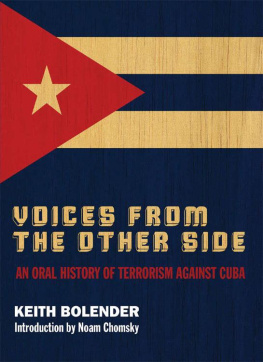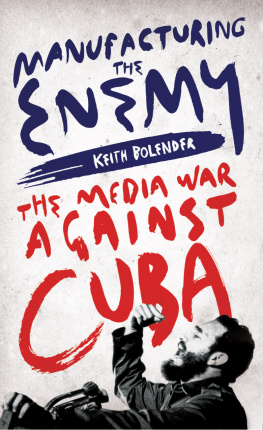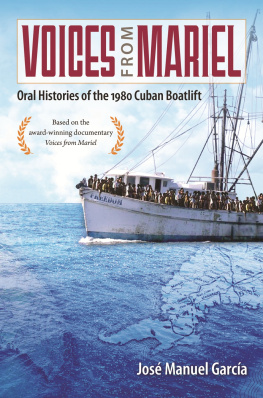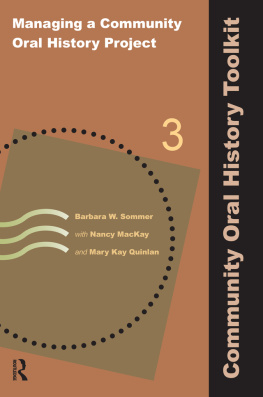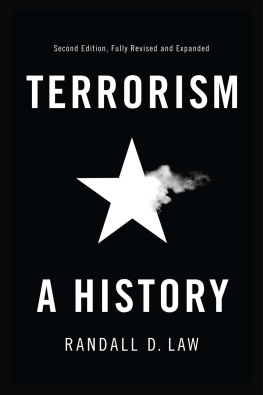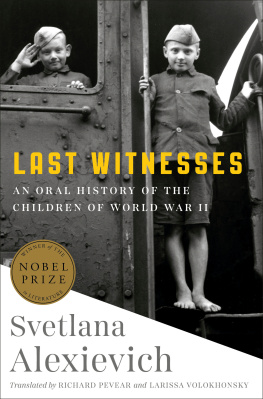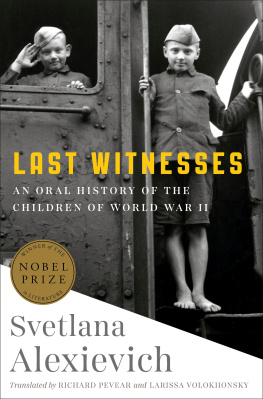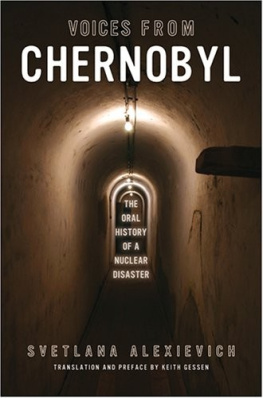Keith Bolender - Voices From the Other Side: An Oral History of Terrorism Against Cuba
Here you can read online Keith Bolender - Voices From the Other Side: An Oral History of Terrorism Against Cuba full text of the book (entire story) in english for free. Download pdf and epub, get meaning, cover and reviews about this ebook. year: 2010, publisher: Pluto Press, genre: Politics. Description of the work, (preface) as well as reviews are available. Best literature library LitArk.com created for fans of good reading and offers a wide selection of genres:
Romance novel
Science fiction
Adventure
Detective
Science
History
Home and family
Prose
Art
Politics
Computer
Non-fiction
Religion
Business
Children
Humor
Choose a favorite category and find really read worthwhile books. Enjoy immersion in the world of imagination, feel the emotions of the characters or learn something new for yourself, make an fascinating discovery.
- Book:Voices From the Other Side: An Oral History of Terrorism Against Cuba
- Author:
- Publisher:Pluto Press
- Genre:
- Year:2010
- Rating:5 / 5
- Favourites:Add to favourites
- Your mark:
- 100
- 1
- 2
- 3
- 4
- 5
Voices From the Other Side: An Oral History of Terrorism Against Cuba: summary, description and annotation
We offer to read an annotation, description, summary or preface (depends on what the author of the book "Voices From the Other Side: An Oral History of Terrorism Against Cuba" wrote himself). If you haven't found the necessary information about the book — write in the comments, we will try to find it.
Voices From the Other Side: An Oral History of Terrorism Against Cuba — read online for free the complete book (whole text) full work
Below is the text of the book, divided by pages. System saving the place of the last page read, allows you to conveniently read the book "Voices From the Other Side: An Oral History of Terrorism Against Cuba" online for free, without having to search again every time where you left off. Put a bookmark, and you can go to the page where you finished reading at any time.
Font size:
Interval:
Bookmark:
VOICES FROM THE OTHER SIDE

345 Archway Road, London N6 5AA
Palgrave Macmillan, a division of st. Martins Press LLC,
175 Fifth Avenue, New York, NY 10010
ISBN 978 0 7453 3040 2 Paperback
ISBN 978 1 7837 1094 2 ePub
ISBN 978 1 7837 1095 9 Mobi
Typeset from disk by Stanford DTP Services, Northampton, England
Printed and bound in the European Union by
CPI Antony Rowe, Chippenham and Eastbourne
A project of this type is the sum of the support and assistance of many people. It has been a long process, starting from efforts to open doors and convince those that the treatment of terrorism from the personal perspective was a worthwhile endeavor.
There are some who need to be noted for their contributions, I regret any names left out that should not have been. On the Cuban side Alicia Garcia was vital to start things off, as were others such as Jorge Timmosi, Enrique Ubieta, Ramon, Emilio, Paquito, everyone at ICAP, Editorial Jose Marti. Id like to thank Juan Carlos at Capitan San Luis for permission to use archive photos and for supplying a large amount of background material for use of the hotel bombing photo, and to Ramn Torreira Crespo from his personal collection, to use the Costa Rican propaganda sheet in Chapter 4 and the newspaper cover of La Coubre explosion. And to Alejandro Robaina for the photo of Jos Basulto et al. All other photos, unless otherwise stated, were taken by the author.
David Castle at Pluto Press deserves special mention for his belief in the project and for providing the opportunity to see it to fruition. And thanks also to all the others at Pluto and Chase.
One cannot finish this without the support of friends and family, Lesme y Magaly, Lesmito and Fanny, Claudia, Martin, Steve, David, Sharon, Brian. Freddie and Richie, Heather and Michael. To Rose and Reg, I wish you were here. And all the rest.
There are some, however, without whose assistance this book would not have been possible. Noam Chomsky has consistently and unhesitatingly encouraged this work (giving so much of his valuable time, of which I remain appreciative, and still a little baffled by). Miguel Alvarez who opened so many doors and helped resolve many of the challenges that needed to be overcome. Raul Verrier who took the project under his wing and worked tirelessly without complaint to accomplish all that was asked.
To Heriberto Nicolas, my closest Cuban friend and my collaborator. The interpreter for the interviews, the translator of the Spanish edition of the book. The transportation, the encouragement and the person who believed in it unquestionably. The person who taught me patience will overcome all.
For all those who allowed me into their homes and their thoughts, thank you.
The opinions expressed in this book are those of the interviewees, not necessarily of the author or publisher.
Noam Chomsky
Perhaps the most striking feature of Washingtons war against Cuba since it dared to liberate itself at last in 1959 has been the frenzy with which it has been waged. Kennedys Bay of Pigs invasion soon after taking office was authorized in an atmosphere of hysteria, Defense Secretary Robert McNamara later testified before the Senates Church Committee. At the first cabinet meeting after the failed invasion, the atmosphere was almost savage, Undersecretary of State Chester Bowles reported, describing an almost frantic reaction for an action program. The core component of the action program was a major terrorist war. Robert Kennedy, who was assigned the task of coordinating the massive campaign of state-directed international terrorism, repeatedly declared that overthrowing the government of Cuba was the top priority of the United States Governmentall else is secondaryno time, money, effort, or manpower is to be spared. The president himself was aware that allies think that were slightly demented on the subject of Cuba, a condition that persists to the present. When Cuba was in dire straits after the collapse of the Soviet Union, liberal Democrats led by Bill Clinton tightened the noose, outflanking the Bush administration from the right, in order to wreak havoc in Cuba (Representative Robert Torricelli, who was point man). The extremism was of some concern to the Pentagon. The US Army War College in 1993 cautioned against the innate emotional appeal driving US policymakers who saw Castro as the embodiment of evil who must be punished for his defiance of the United States as well as for other reprehensible deedsthough whether any of those conjured up ranked as high as defiance of the United States is doubtful.
The Kennedy brothers sought to bring the terrors of the earth to Cuba, in the words of JFK adviser and confidant historian Arthur Schlesinger. The terrorist war against Cuba peaked again in the late 1970s. The Reagan administration reacting by adding Cuba to the list of states that sponsor terror. The irony passed without notice, as did the fact that Cuba replaced Saddam Hussein, who had to be removed so that the Reaganites could provide substantial aid to their new friend. Saddam remained a favored friend until 1990, when he quickly shifted status to reincarnation of Hitler by committing a real crime, not trivial misdemeanors like slaughtering Kurds but disobeying orders, or perhaps misunderstanding them. After the US invasion of Iraq he was captured, tried, and sentenced to deathfor crimes committed in 1982, the year when he was dropped from the list of states supporting terror. Again, the ironies passed unnoticed.
There was of course an official pretext for condemning Cuba as a terrorist state in 1982: Cuba was allegedly supporting Central Americans who were resisting the war on terror declared by the Reagan administration as it entered officein reality, an extraordinary terrorist assault on Central Americans that claimed hundreds of thousands of lives and left much of the region in ruins, handed down in history as a grand victory of American idealism and promotion of democracy. The other standard official reason, until today, is Cubas human rights record, a pretext that can only inspire ridicule outside of deeply indoctrinated circles, in the light of the human rights records of Washingtons favored clients, not to speak of its own.
While launching his terrorist campaign, President Kennedy also sharply intensified the embargo that President Eisenhower had initiatedlegitimately, high officials explained, because The Cuban people [are] responsible for the regime (Undersecretary of State Douglas Dillon) and therefore must suffer hunger and deprivation for its sins. Kennedy agreed that it was Washingtons right and duty to cause rising discomfort among hungry Cubans. Eisenhower State Department official Lester Mallory had outlined the basic thinking in April 1960, at the time when the Administration secretly committed itself to overthrowing the insolent regime: Castro would be removed through disenchantment and disaffection based on economic dissatisfaction and hardship [so] every possible means should be undertaken promptly to weaken the economic life of Cuba [in order to] bring about hunger, desperation and [the] overthrow of the government.
Next pageFont size:
Interval:
Bookmark:
Similar books «Voices From the Other Side: An Oral History of Terrorism Against Cuba»
Look at similar books to Voices From the Other Side: An Oral History of Terrorism Against Cuba. We have selected literature similar in name and meaning in the hope of providing readers with more options to find new, interesting, not yet read works.
Discussion, reviews of the book Voices From the Other Side: An Oral History of Terrorism Against Cuba and just readers' own opinions. Leave your comments, write what you think about the work, its meaning or the main characters. Specify what exactly you liked and what you didn't like, and why you think so.

